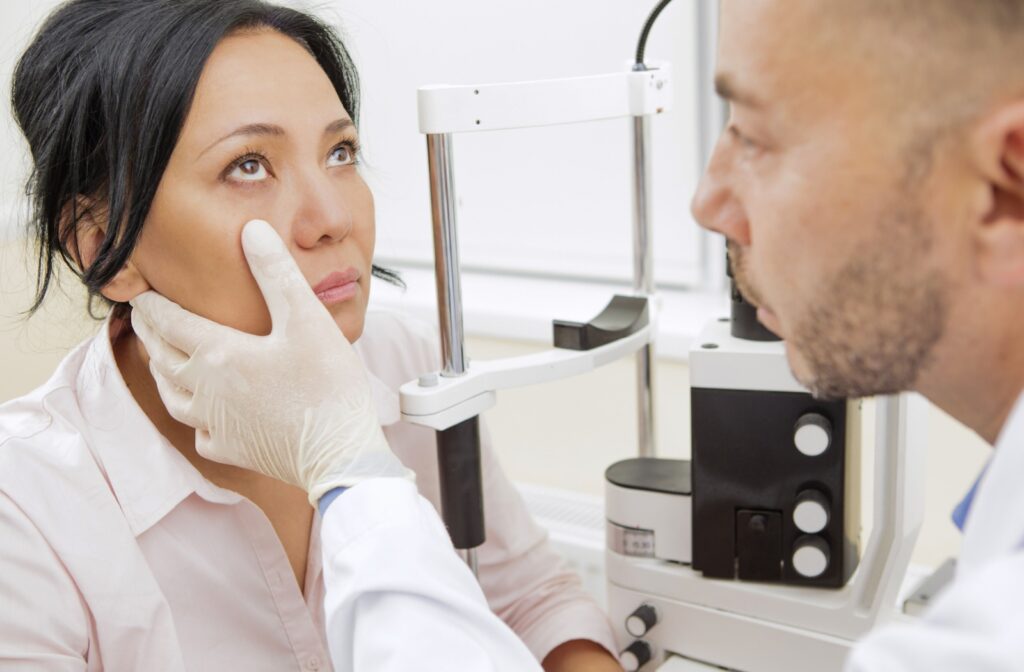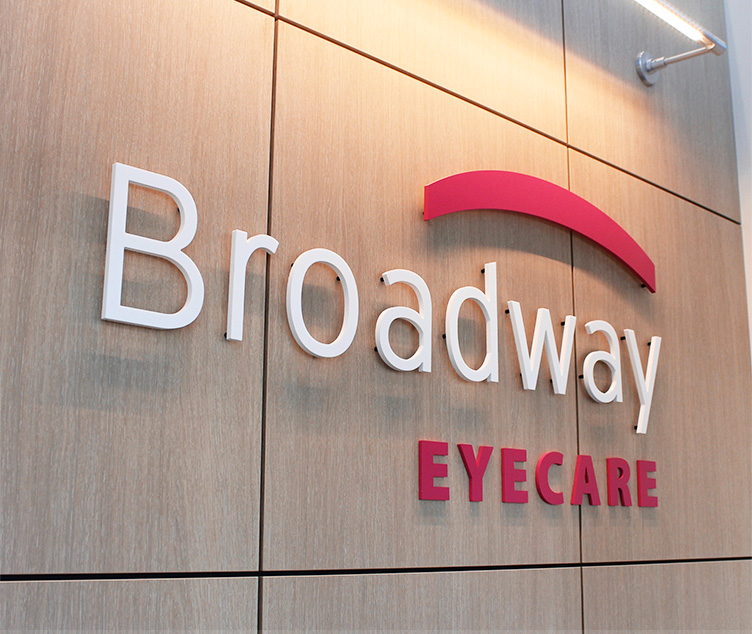Cataracts are an eye condition often associated with aging and involves the clouding of the lens of your eye, which causes vision to be blurred. Cataracts can cause vision loss, but it is treatable.
Your optometrist can diagnose cataracts by conducting several tests during an eye exam. Based on the stage of cataracts, they can recommend prescription updates or surgery to provide clearer vision.
What Are Cataracts?
Cataracts often develop due to the natural clouding of the eye’s lens due to aging. The lens helps to focus light entering the eye onto the retina (the light-sensitive tissue at the back of the eye) to form a clear image. The eye’s lens consists of water and proteins, but when these proteins start to clump together, they can cloud areas of the lens, which is a cataract.
Cataracts often form slowly and are subtle in their development, causing a gradual decline in vision. At first, stronger lighting and eyeglasses can help with cataracts, but as the condition progresses, it could interfere with daily activities such as reading, driving, or recognizing faces.
You can develop cataracts in one or both eyes, together or at different times. Cataracts can also develop rapidly over several months.
Types of Cataracts
There are various types of cataracts besides age-related cataracts, including:
- Traumatic cataracts result from eye injuries that directly damage the lens
- Radiation cataracts result from prolonged exposure to ultraviolet radiation (UV) from sunlight
- Congenital cataracts occur in babies born with cataracts
- Secondary cataracts are caused by medical conditions like diabetes or after surgery or an eye infection
Cataract Symptoms
As a cataract gradually forms, it doesn’t immediately affect your vision. Signs and symptoms often become noticeable months to years after the development of a cataract.
Common symptoms of cataracts include:
- Cloudy or blurry vision
- Double vision
- Glare and light sensitivity
- Need for brighter light when reading
- Diminished colour perception
- Noticing halos around lights
- Trouble with night driving
Symptoms can vary depending on the type of cataract and its progression. Some types of cataracts might not cause changes to your vision, but others do lead to significant vision loss over time, necessitating treatment.
Role of Optometrists in Diagnosing Cataracts
Optometrists provide primary eye care services, including comprehensive eye exams, vision correction, and diagnosis and treatment of eye conditions. With regular eye exams, your optometrist can monitor your eye health and detect and diagnose cataracts.
During an eye exam, your optometrist will conduct tests to diagnose cataracts.
Visual Acuity Test
One of the simplest and most common tests is the visual acuity test. This test involves checking how well you can see and if your eyeglasses prescription still provides clear vision. If your prescription has changed, it could indicate a cataract has developed.
Retinal Examination
A retinal exam allows your optometrist to inspect the retina for early signs of cataracts. Through pupil dilation, they can get a better view of the inside of the eye, the lens, and the overall health of your eye.
Slit-Lamp Examination
A slit lamp is a specialized microscope with a bright light that lets your optometrist examine the back of the eye and the lens for cataracts in high magnification.
Cataract Treatment
During the early stages of a cataract, your optometrist may prescribe glasses to provide clear vision for everyday tasks. However, when cataracts progress to a stage where they begin to impact your quality of life and normal vision, which glasses can no longer improve, your optometrist may recommend further evaluation and potential surgery.
Cataract Surgery
Cataract surgery is the only way to treat a cataract and is done separately on each eye. Cataract surgery involves removing the cloudy lens from the eye and replacing it with a clear, artificial lens. Cataract surgery is one of Canada’s most common and low-risk surgeries.
Preventing Cataracts
While you can’t stop a cataract from forming, there are things you can do to reduce your risk of cataracts, such as:
- Protecting your eye from excessive sun exposure by wearing sunglasses
- Quitting smoking
- Eating a healthy diet
- Managing health problems
Attend regular eye exams even if you do not notice any vision changes. Early diagnosis and intervention can prevent cataracts from severely impacting your vision.
If you’ve been diagnosed with cataracts, adhere to your optometrist’s and ophthalmologist’s recommended follow-up schedule and treatment plans. Being an active participant in your eye care can lead to better outcomes.
The Optometrist’s Role in Cataract Care
Cataracts are part of the natural aging process, but with early detection and coordinated care, clear vision and the enjoyment of life’s visual details can remain. A visit to your optometrist can be your first step in the comprehensive care of cataracts.
Book an eye exam with Broadway Eyecare if you’re at high risk, have a family history of cataracts, or are over 60.









